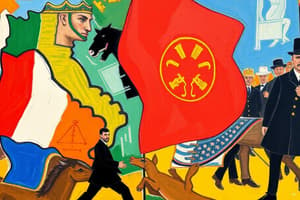Podcast
Questions and Answers
How did Prussia replace Austria as the leading German state in Europe?
How did Prussia replace Austria as the leading German state in Europe?
Prussia replaced Austria during the reigns of Frederick William I and his son Frederick the Great, leading the fight for unification of German states.
How did Napoleon's rule inspire nationalism?
How did Napoleon's rule inspire nationalism?
German nationalism favored Prussia more than Austria, as Austria had a mix of nationalities while everyone in Prussia was German.
What economic changes were made by the Junkers to improve the economy?
What economic changes were made by the Junkers to improve the economy?
Junkers campaigned for the abolition of tariffs to facilitate the movement of goods, which convinced the king of Prussia to abolish tariffs in 1818.
In 1848, what did the National Assembly try to unify the country?
In 1848, what did the National Assembly try to unify the country?
Who were William I and Otto von Bismarck?
Who were William I and Otto von Bismarck?
Why was Bismarck considered a 'realpolitik'? How did he outmaneuver the Prussian parliament?
Why was Bismarck considered a 'realpolitik'? How did he outmaneuver the Prussian parliament?
What were Bismarck's two main objectives in increasing Prussia's power?
What were Bismarck's two main objectives in increasing Prussia's power?
How did the Danish War, Seven Weeks War, and Franco-Prussian War help Bismarck achieve his objectives?
How did the Danish War, Seven Weeks War, and Franco-Prussian War help Bismarck achieve his objectives?
How did German unification differ from Italian unification?
How did German unification differ from Italian unification?
After the unification, what was the makeup of the German government?
After the unification, what was the makeup of the German government?
Flashcards are hidden until you start studying
Study Notes
The Unification of Germany
- Prussia became the leading German state during Frederick William I and Frederick the Great's reign, positioning itself against Austria.
- German nationalism was intensified by Napoleon's rule, with Prussia favored over Austria due to its ethnic homogeneity.
- Austria, a multi-national empire, faced distractions in the Balkans after territorial losses at the Congress of Vienna.
- Junkers, influential landowners, sought economic reforms and successfully advocated for the abolition of internal tariffs in Prussia by 1818.
- In 1848, the Frankfurt National Assembly aimed for national unity and drafted a constitution establishing a limited monarchy, but faced opposition due to unmet liberal demands.
- William I became King of Prussia in 1861, with Otto von Bismarck appointed as prime minister, who aimed to solidify Prussia's position and unify Germany.
- Bismarck, a conservative Junker politician, built up the Prussian military and opposed parliamentary democracy, believing in strong state authority.
- He bypassed the Prussian parliament by collecting taxes without consent and disregarded constitutional limits, angering the monarchy.
- Bismarck's main objectives included expanding Prussia's influence and unifying the German people.
- The Danish War allowed Prussia to assert dominance over Schleswig, reducing Austrian control in the German states.
- The Seven Weeks' War resulted in Prussia gaining Schleswig and diminishing Austria's influence, culminating in the establishment of the North German Confederation.
- The Franco-Prussian War unified German states against a common enemy, resulting in victory over France and further consolidation of Germany.
- German unification was a structured process, contrasting with the more chaotic Italian unification led by plebiscites.
- Post-unification, Germany adopted a federal constitution where the emperor (Kaiser) held significant power, while local governments managed education and local laws.
Studying That Suits You
Use AI to generate personalized quizzes and flashcards to suit your learning preferences.




